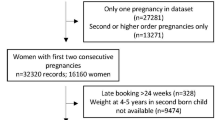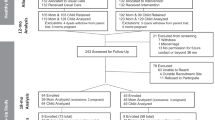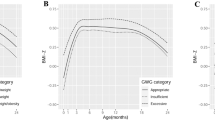Abstract
Objective
Current guidelines for maternal weight gain in twin pregnancy were established in the absence of evidence on its longer-term consequences for maternal and child health. We evaluated the association between weight gain in twin pregnancies and the risk of excess maternal postpartum weight increase, childhood obesity, and child cognitive ability.
Methods
We used 5-year follow-up data from 1000 twins born to 450 mothers in the Early Childhood Longitudinal Study—Birth Cohort, a nationally representative U.S. cohort of births in 2001. Pregnancy weight gain was standardized into gestational age- and prepregnancy body mass index (BMI)-specific z-scores. Excess postpartum weight increase was defined as ≥10 kg increase from prepregnancy weight. We defined child overweight/obesity as BMI ≥ 85th percentile, and low reading and math achievement as scores one standard deviation below the mean. We used survey-weighted multivariable modified Poisson models with a log link to relate gestational weight gain z-score with each outcome.
Results
Excess postpartum weight increase occurred in 40% of mothers. Approximately 28% of twins were affected by overweight/obesity, and 16 and 14% had low reading and low math scores. There was a positive linear relationship between pregnancy weight gain and both excess postpartum weight increase and childhood overweight/obesity. Compared with a gestational weight gain z-score 0 SD (equivalent to 20 kg at 37 weeks gestation), a weight gain z-score of +1 SD (27 kg) was associated with 6.3 (0.71, 12) cases of excess weight increase per 1000 women and 4.5 (0.81, 8.2) excess cases of child overweight/obesity per 100 twins. Gestational weight gain was not related to kindergarten academic readiness.
Conclusions
The high prevalence of excess postpartum weight increase and childhood overweight/obesity within the recommended ranges of gestational weight gain for twin pregnancies suggests that these guidelines could be inadvertently contributing to longer-term maternal and child obesity.
This is a preview of subscription content, access via your institution
Access options
Subscribe to this journal
Receive 12 print issues and online access
$259.00 per year
only $21.58 per issue
Buy this article
- Purchase on SpringerLink
- Instant access to full article PDF
Prices may be subject to local taxes which are calculated during checkout

Similar content being viewed by others
Code availability
Computer code and data will not be available due to data use agreements with the U.S. Department of Education.
References
Perez-Escamilla R, Kac G. Childhood obesity prevention: a life-course framework. Int J Obes Suppl. 2013;3:S3–S5.
Abrams B, Coyle J, Cohen AK, Headen I, Hubbard A, Ritchie L, et al. Excessive gestational weight gain and subsequent maternal obesity at age 40: a hypothetical intervention. Am J Public Health. 2017;107:1463–9.
Poston L, Harthoorn LF, Van Der Beek EM. Obesity in pregnancy: implications for the mother and lifelong health of the child. A consensus statement. Pediatr Res. 2011;69:175–80.
Mamun AA, Mannan M, Doi SA. Gestational weight gain in relation to offspring obesity over the life course: a systematic review and bias-adjusted meta-analysis. Obes Rev. 2014;15:338–47.
Voerman E, Santos S, Patro Golab B, Amiano P, Ballester F, Barros H, et al. Maternal body mass index, gestational weight gain, and the risk of overweight and obesity across childhood: An individual participant data meta-analysis. PLoS Med. 2019;16:e1002744.
Institute of Medicine. Weight Gain During Pregnancy: Reexamining the Guidelines. Washington, DC: National Academies Press; 2009.
Najarian M, Snow K, Lennon J, Kinsey S. Early Childhood Longitudinal Study, Birth Cohort (ECLS-B), Preschool-Kindergarten 2007 Psychometric Report (NCES 2010–009). Washington, DC: National Center for Education Statistics, Institute of Education Sciences, US Department of Education; 2010.
Snow K, Thalji L, Derecho A, Wheeless JL, Lennon J, Kinsey S et al. User’s Manual for the ECLS-B Longitudinal 9-Month—Preschool Restricted Use Data File and Electronic Codebook. Washington, D.C.: National Center for Education Statistics, Institute of Education Sciences, US Department of Education; 2007.
Snow K, Thalji L, Derecho A, Wheeless JL, Lennon J, Kinsey S et al. Early Childhood Longitudinal Study, Birth Cohort (ECLS-B) Kindergarten 2006 and 2007 Data File User’s Manual. Washington, D.C.: National Center for Education Statistics, Institute of Education Sciences, US Department of Education; 2009.
Hutcheon JA, Platt RW, Abrams B, Braxter BJ, Eckhardt CL, Himes KP, et al. Pregnancy weight gain by gestational age in women with uncomplicated dichorionic twin pregnancies. Paediatr Perinat Epidemiol. 2018;32:172–80.
Grummer-Strawn LM, Reinold C, Krebs NF. Use of World Health Organization and CDC growth charts for children aged 0-59 months in the United States. MMWR Recomm Rep. 2010;59:1–15.
Office of the Assistant Secretary for Planning and Evaluation in the US Department of Health & Human Services. The 2011 HHS Poverty Guidelines. In, 2011. https://aspe.hhs.gov/2011-hhs-poverty-guidelines (Accessed on June 2020).
Carlin JB, Gurrin LC, Sterne JA, Morley R, Dwyer T. Regression models for twin studies: a critical review. Int J Epidemiol. 2005;34:1089–99.
Harrell FE Jr, Lee KL, Pollock BG. Regression models in clinical studies: determining relationships between predictors and response. J Natl Cancer Inst. 1988;80:1198–202.
Glymour MM, Greenland S. Causal diagrams. In: Rothman KJ, Greenland S, Lash TL, editors. Modern epidemiology, 3rd edition. Philadelphia, PA: Lippincott Williams & Wilkins; 2008.
Royston P. Multiple imputation of missing values: further update of ice, with an emphasis on categorical variables. Stata J. 2009;9:466–77.
Sterne JA, White IR, Carlin JB, Spratt M, Royston P, Kenward MG, et al. Multiple imputation for missing data in epidemiological and clinical research: potential and pitfalls. BMJ. 2009;338:b2393.
Michel S, Raab R, Drabsch T, Gunther J, Stecher L, Hauner H. Do lifestyle interventions during pregnancy have the potential to reduce long-term postpartum weight retention? A systematic review and meta-analysis. Obes Rev. 2019;20:527–42.
Tanentsapf I, Heitmann BL, Adegboye AR. Systematic review of clinical trials on dietary interventions to prevent excessive weight gain during pregnancy among normal weight, overweight and obese women. BMC Pregnancy Childbirth. 2011;11:81.
Nehring I, Schmoll S, Beyerlein A, Hauner H, von Kries R. Gestational weight gain and long-term postpartum weight retention: a meta-analysis. Am J Clin Nutr. 2011;94:1225–31.
Widen EM, Whyatt RM, Hoepner LA, Ramirez-Carvey J, Oberfield SE, Hassoun A, et al. Excessive gestational weight gain is associated with long-term body fat and weight retention at 7 y postpartum in African American and Dominican mothers with underweight, normal, and overweight prepregnancy BMI. Am J Clin Nutr. 2015;102:1460–7.
McClure CK, Catov JM, Ness R, Bodnar LM. Associations between gestational weight gain and BMI, abdominal adiposity, and traditional measures of cardiometabolic risk in mothers 8 y postpartum. Am J Clin Nutr. 2013;98:1218–25.
Soria-Contreras DC, Rifas-Shiman SL, Aris IM, Perng W, Switkowski KM, Tellez-Rojo MM, et al. Weight trajectories after delivery are associated with adiposity and cardiometabolic markers at 3 years postpartum among women in project viva. J Nutr. 2020;150:1889–98.
Walter JR, Perng W, Kleinman KP, Rifas-Shiman SL, Rich-Edwards JW, Oken E. Associations of trimester-specific gestational weight gain with maternal adiposity and systolic blood pressure at 3 and 7 years postpartum. Am J Obstet Gynecol. 2015;212:499.e1–12.
Fraser A, Tilling K, Macdonald-Wallis C, Hughes R, Sattar N, Nelson SM, et al. Associations of gestational weight gain with maternal body mass index, waist circumference, and blood pressure measured 16 y after pregnancy: the Avon Longitudinal Study of Parents and Children (ALSPAC). Am J Clin Nutr. 2011;93:1285–92.
Hinkle SN, Sharma AJ, Swan DW, Schieve LA, Ramakrishnan U, Stein AD. Excess gestational weight gain is associated with child adiposity among mothers with normal and overweight prepregnancy weight status. J Nutr. 2012;142:1851–8.
Karachaliou M, Georgiou V, Roumeliotaki T, Chalkiadaki G, Daraki V, Koinaki S, et al. Association of trimester-specific gestational weight gain with fetal growth, offspring obesity, and cardiometabolic traits in early childhood. Am J Obstet Gynecol. 2015;212:502.e1–14.
Lu W, Zhang X, Wu J, Mao X, Shen X, Chen Q, et al. Association between trimester-specific gestational weight gain and childhood obesity at 5 years of age: results from Shanghai obesity cohort. BMC Pediatr. 2019;19:139.
Hivert MF, Rifas-Shiman SL, Gillman MW, Oken E. Greater early and mid-pregnancy gestational weight gains are associated with excess adiposity in mid-childhood. Obesity. 2016;24:1546–53.
Pugh SJ, Hutcheon JA, Richardson GA, Brooks MM, Himes KP, Day NL, et al. Child academic achievement in association with pre-pregnancy obesity and gestational weight gain. J Epidemiol Community Health. 2016;70:534–40.
Gage SH, Lawlor DA, Tilling K, Fraser A. Associations of maternal weight gain in pregnancy with offspring cognition in childhood and adolescence: findings from the Avon longitudinal study of parents and children. Am J Epidemiol. 2013;177:402–10.
Keim SA, Pruitt NT. Gestational weight gain and child cognitive development. Int J Epidemiol. 2012;41:414–22.
Hinkle SN, Albert PS, Sjaarda LA, Grewal J, Grantz KL. Trajectories of maternal gestational weight gain and child cognition assessed at 5 years of age in a prospective cohort study. J Epidemiol Community Health. 2016;70:696–703.
Pugh SJ, Richardson GA, Hutcheon JA, Himes KP, Brooks MM, Day NL, et al. Maternal obesity and excessive gestational weight gain are associated with components of child cognition. J Nutr. 2015;145:2562–9.
Kominiarek MA, Smid MC, Mele L, Casey BM, Sorokin Y, Reddy UM, et al. Child neurodevelopmental outcomes by prepregnancy body mass index and gestational weight gain. Obstet Gynecol. 2018;132:1386–93.
Shambaugh GE,3rd, Angulo MC, Koehler RR.Fetal fuels VII. Ketone bodies inhibit synthesis of purines in fetal rat brain. Am J Physiol. 1984;247:E111–7.
Mendola P, Selevan SG, Gutter S, Rice D. Environmental factors associated with a spectrum of neurodevelopmental deficits. Ment Retard Dev Disabil Res Rev. 2002;8:188–97.
Felig P. Maternal and fetal fuel homeostasis in human pregnancy. Am J Clin Nutr. 1973;26:998–1005.
Gin H, Vambergue A, Vasseur C, Rigalleau V, Dufour P, Roques A, et al. Blood ketone monitoring: a comparison between gestational diabetes and non-diabetic pregnant women. Diabetes Metab. 2006;32:592–7.
Headen I, Cohen AK, Mujahid M, Abrams B. The accuracy of self-reported pregnancy-related weight: a systematic review. Obes Rev. 2017;18:350–69.
Bodnar LM, Abrams B, Bertolet M, Gernand AD, Parisi SM, Himes KP, et al. Validity of birth certificate-derived maternal weight data. Paediatric Perinatal Epidemiol. 2014;28:203–12.
Bodnar LM, Abrams B, Siminerio L, Lash TL. Validity of birth certificate-derived maternal weight data in twin pregnancies. Matern Child Nutr. 2016;12:632–8.
Lash TL. Heuristic thinking and inference from observational epidemiology. Epidemiology. 2007;18:67–72.
Bodnar LM, Pugh SJ, Lash TL, Hutcheon JA, Himes KP, Parisi SM, et al. Low gestational weight gain and risk of adverse perinatal outcomes in obese and severely obese women. Epidemiology. 2016;27:894–902.
Bodnar LM, Siminerio LL, Himes KP, Hutcheon JA, Lash TL, Parisi SM, et al. Maternal obesity and gestational weight gain are risk factors for infant death. Obesity. 2015;24:490–8.
Bodnar LM, Himes KP, Abrams B, Lash TL, Parisi SM, Eckhardt CL, et al. Gestational Weight Gain and Adverse Birth Outcomes in Twin Pregnancies. Obstet Gynecol. 2019;134:1075–86.
Author information
Authors and Affiliations
Corresponding author
Ethics declarations
Conflict of interest
This study is supported by grant funding from the Eunice Kennedy Shriver National Institute of Child Health and Human Development (NICHD) R01 HD094777 to LMB and JAH. JAH holds a Canada Research Chair in Perinatal Population Health from the Canadian Federal Government. The funders had no role in the study design, data collection and analysis, decision to publish, or preparation of the manuscript. The authors declare no other competing interests.
Additional information
Publisher’s note Springer Nature remains neutral with regard to jurisdictional claims in published maps and institutional affiliations.
Supplementary information
Rights and permissions
About this article
Cite this article
Bodnar, L.M., Cartus, A.R., Parisi, S.M. et al. Pregnancy weight gain in twin gestations and maternal and child health outcomes at 5 years. Int J Obes 45, 1382–1391 (2021). https://doi.org/10.1038/s41366-021-00792-8
Received:
Revised:
Accepted:
Published:
Issue date:
DOI: https://doi.org/10.1038/s41366-021-00792-8
This article is cited by
-
Maternal weight, blood lipids, and the offspring weight trajectories during infancy and early childhood in twin pregnancies
World Journal of Pediatrics (2023)



